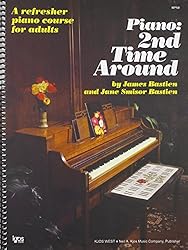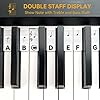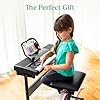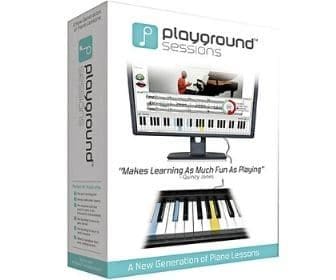Table of Contents
Introduction to Learning Piano Online
Embarking on the journey of learning to play the piano can be both exciting and daunting. With the advent of technology, beginners have a new accessible route: online piano courses. This guide delves into the nuances of starting your musical journey from the comfort of your home, highlighting the benefits and challenges of such a modern learning path. Online courses offer flexibility, a wide range of resources, and the ability to learn at your own pace, making it an appealing option for many aspiring musicians.
Choosing the Right Online Piano Course for You
With a plethora of online piano courses available, it’s crucial to select one that aligns with your learning style and goals. Here are some factors to consider when choosing the right online piano course for you:
The Piano Proficiency Exam Review Book
22% OffPiano Adventures - Level 2A Lesson Book
$6.99 (as of December 27, 2025 20:43 GMT -08:00 - More infoProduct prices and availability are accurate as of the date/time indicated and are subject to change. Any price and availability information displayed on [relevant Amazon Site(s), as applicable] at the time of purchase will apply to the purchase of this product.)P71 Digital Piano Review and Guide
$0.00 (as of December 27, 2025 20:41 GMT -08:00 - More infoProduct prices and availability are accurate as of the date/time indicated and are subject to change. Any price and availability information displayed on [relevant Amazon Site(s), as applicable] at the time of purchase will apply to the purchase of this product.)Piano 2nd Time Around : A Refresher Piano Course for Adults
Identify your current skill level before selecting a course. Many platforms offer courses categorized by beginner, intermediate, and advanced levels. Starting with a course tailored to your level ensures that the material won’t be too challenging or too simplistic.
Research the instructors’ backgrounds. Look for courses taught by professionals with extensive experience or formal education in music. Reading reviews or watching introductory videos can give you a sense of their teaching style and expertise.
Evaluate the course structure to make sure it fits your lifestyle. Some courses might offer self-paced lessons, while others may follow a more structured, scheduled approach. If you have a busy schedule, a self-paced course might be more suitable.
Look for a comprehensive curriculum that covers both the fundamentals and more advanced techniques. Make sure the course includes a mix of theory, practice, and music reading skills. Some courses might also offer additional resources like sheet music, practice exercises, and quizzes.
Beginner Piano Lessons for Kids Book: with Online Video & Audio Access
Beginner Piano Book for Kids | Piano Lessons | Learn to Play Your First Songs | Intro to Piano
$10.97 (as of December 28, 2025 00:12 GMT -08:00 - More infoProduct prices and availability are accurate as of the date/time indicated and are subject to change. Any price and availability information displayed on [relevant Amazon Site(s), as applicable] at the time of purchase will apply to the purchase of this product.)120 Famous Easy Piano Songs for Beginners: Popular Sheet Music and Simplified Classical Pieces, With Videos, Music Theory & Technique, Step by Step, for Kids or Amateurs of Any Age
$9.99 (as of December 28, 2025 00:12 GMT -08:00 - More infoProduct prices and availability are accurate as of the date/time indicated and are subject to change. Any price and availability information displayed on [relevant Amazon Site(s), as applicable] at the time of purchase will apply to the purchase of this product.)BEATBIT Piano Notes Guide for Beginner, Removable Piano Keyboard Note Labels for Learning, 88-Key Full Size, Made of Silicone, No Need Stickers, Reusable and Comes with Box (Classic Black)
$14.99 (as of December 28, 2025 00:12 GMT -08:00 - More infoProduct prices and availability are accurate as of the date/time indicated and are subject to change. Any price and availability information displayed on [relevant Amazon Site(s), as applicable] at the time of purchase will apply to the purchase of this product.)Interactive features such as live sessions, student forums, and direct feedback from instructors can significantly enhance your learning experience. Courses that offer regular quizzes and assignments encourage active participation and help solidify your learning.
Consider the technological requirements of the course. Some courses may require specific software, a digital piano, or a MIDI keyboard. Ensure that your equipment is compatible with the course requirements and that you’re comfortable using the necessary technology.
Compare the costs of different courses. While some are free or relatively inexpensive, others might be a substantial investment. It’s essential to ensure that the course offers good value for your money, with comprehensive content and access to qualified instructors.
Many platforms offer trial periods or money-back guarantees. Taking advantage of these options can help you assess whether the course meets your expectations before committing fully.
Setting Up Your Space for Online Piano Lessons
Setting up an organized, distraction-free space is critical for maximizing the benefits of online piano lessons. Here’s how you can create an ideal learning environment in your home:
Choose the Right Location
Pick a quiet room where you won’t be disturbed. Ideally, this space should be away from high-traffic areas in your home. Your practice space needs to be an area where you feel comfortable and focused. Reducing distractions will help you stay concentrated during lessons and practice sessions.
Proper Lighting
Ensure that your piano or keyboard is well-lit. Good lighting is necessary to clearly see the piano keys as well as your sheet music or digital notes. Natural lighting is excellent, but if that’s not possible, position a good-quality lamp to provide ample, even lighting. Avoid harsh, glaring lights to reduce eye strain.
Stable Internet Connection
A stable and fast internet connection is essential for online learning. An unstable connection can cause video and audio lag, which disrupts the flow of your lessons. If possible, use a wired Ethernet connection or position your device as close to the Wi-Fi router as possible.
Right Equipment Setup
Make sure your device for video calls (laptop, tablet, or smartphone) is positioned at the right height and angle. The ideal setup allows your instructor to view your hands clearly as they move across the piano. You might need a stand or a stack of books to achieve the right height. Likewise, ensure your device’s camera can capture your face for effective communication.
Quality Audio
Good audio quality is paramount. Most built-in microphones are not designed for music, so investing in an external microphone can markedly improve sound quality. Additionally, using headphones can help you hear your instructor more clearly and also reduce external noise.
Organizing Your Materials
Keep your sheet music, notebooks, metronome, and any other learning materials within arm’s reach. Having everything organized in one place prevents disruptions during your practice. Consider using a music stand for easy access to your sheet music and keeping a tablet or computer nearby if you use digital resources.
Comfortable Seating
Choose a chair or bench that provides proper support and encourages good posture. Avoid chairs that are too soft; a straight-backed chair or an adjustable piano bench is ideal. Maintaining a comfortable and correct posture helps prevent muscle strain and allows for better control over piano-playing techniques.
By preparing your learning space thoughtfully, you can create an environment that fosters effective and enjoyable piano practice. Attention to these details ensures you get the most out of your online piano lessons.
Staying Motivated While Learning Online
Learning the piano through online courses offers flexibility, but it can be challenging to stay motivated without the structure of in-person classes. Here are several strategies to keep you inspired and committed to your musical journey:
One of the essential steps to staying motivated is to set clear and achievable goals. Break down your learning process into smaller milestones. Instead of aiming to “become proficient at the piano,” set specific targets like “learn to play a particular song,” or “master a specific technique.” These smaller, manageable objectives provide a sense of accomplishment as you progress.
Designate a quiet and comfortable area in your home specifically for piano practice. A dedicated space helps reinforce the habit of practicing regularly. Ensure that your practice environment is free from distractions, has good lighting, and includes everything you need, such as your sheet music and a metronome.
Consistency is key when learning any new skill. Establish a regular practice schedule that fits into your daily routine, even if it’s just for 20-30 minutes a day. Consistency helps build muscle memory and improves your skills over time. Consider using reminders or alarms to ensure you stick to your practice times.
Engage with online communities or groups of fellow piano learners. Platforms like Reddit, Facebook groups, or dedicated forums like Piano World offer spaces to share progress, ask questions, and gain encouragement. Being part of a supportive community helps reduce feelings of isolation and provides motivation through shared experiences.
Use apps and tools designed for musicians to track your progress. Applications like Simply Piano or Piano Marvel offer features to monitor your practice sessions, provide feedback, and show improvement over time. Visualizing your progress can be incredibly motivating, as it highlights your advancements and areas needing focus.
Integrate enjoyable activities into your practice sessions to avoid monotony. Play your favorite songs, experiment with improvisation, or use gamified learning platforms. Making practice fun increases your enthusiasm and keeps you returning to the keyboard.
Explore various online resources to obtain a well-rounded education. Utilize video tutorials, attend live webinars, read articles, and try different online courses. Variety helps maintain interest and exposes you to diverse teaching styles and techniques.
Establish a reward system for reaching your milestones. Whether it’s taking a break to enjoy your favorite snacks, watching a special movie, or even purchasing a new piece of music gear, rewards provide a tangible incentive for your hard work and dedication.
A positive attitude is vital for sustained motivation. Recognize and celebrate your small achievements and don’t be too hard on yourself during challenging times. Self-encouragement and patience are significant factors in overcoming obstacles and continuing your journey with enthusiasm.
Piano Marvel
Piano Marvel offers a structured curriculum that covers a wide range of skill levels, from beginner to advanced. The platform features interactive sheet music, real-time feedback, and a variety of exercises to improve both technique and theory understanding. The Practice Mode helps learners to focus on difficult sections, while Assessment Mode provides consistent tracking of progress.
Flowkey
Flowkey combines video lessons with interactive sheet music to create an engaging learning experience. The app listens as you play and provides real-time feedback, making sure you stay on track. It covers different music genres and skill levels and offers an “Introductory Course” to get absolute beginners started.
Skoove
Skoove offers personalized lessons based on a learner’s pace and progress. The app listens to your playing and offers feedback to help improve your skills. It features over 400 lessons that cover a variety of genres, and it allows for both hands-on practice and theoretical learning. The platform is known for its user-friendly interface and structured curriculum.
Yousician
Yousician is known for its interactive and gamified approach to learning piano. It listens to your play and offers instant feedback. The app includes comprehensive lessons covering chords, melody, and rhythm, making it suitable for beginners as well as more advanced players. Yousician focuses heavily on making practice fun and engaging through game-like rewards and progress tracking.
Simply Piano
Simply Piano by JoyTunes is an easy-to-use app designed for all ages and skill levels. The app provides step-by-step instructions and instant feedback on your playing. It’s particularly good for beginners, with introductory courses teaching the basics of reading sheet music and playing with both hands. Simply Piano utilizes popular songs to help users quickly engage and motivate their practice sessions.
Playground Sessions
Playground Sessions is unique because it was co-created by legendary musician Quincy Jones. The platform offers a mix of video tutorials and interactive sheet music. Lessons range from beginner to advanced and cover various genres, including pop and classical. The app provides real-time feedback, and progress is tracked to help learners stay motivated.
Pianote
Pianote offers a comprehensive learning experience that includes video lessons, sheet music, and weekly live sessions. The platform provides feedback through a supportive community of teachers and learners. The lessons are structured into easy-to-follow courses that cover everything from basic techniques to more advanced skills. Pianote also offers a unique “Method” based on decades of teaching experience.
Progressing from Beginner to Intermediate Online
To move from beginner to intermediate, start by revisiting and refining the basic techniques you learned initially. Make sure your posture, hand position, and finger movements are correct. Online courses like the Piano Marvel platform offer comprehensive drills to ensure that your foundation is rock solid.
Understanding music theory is crucial for any pianist. At this stage, begin integrating lessons that cover scales, chords, and key signatures. Websites such as MusicTheory.net provide interactive lessons and exercises that can enhance your theoretical knowledge.
Transitioning to intermediate levels involves learning how to read and play from sheet music. Start with simpler sheet music available on platforms like MuseScore and gradually work your way towards more complex pieces. This will improve both your sight-reading skills and your ability to interpret written music.
Broaden your musical repertoire by exploring various genres beyond classical music. Courses on platforms such as Udemy offer lessons in jazz, blues, pop, and more. Experimenting with different styles will not only keep your practice sessions exciting but also enhance your versatility as a pianist.
Become a part of online piano communities like Reddit’s Piano Subreddit or Classic FM. Interacting with other learners can provide you with valuable feedback, encouragement, and resources that can expedite your learning process.
Record your practice sessions and performances using your smartphone or a webcam. Reviewing these recordings can help you identify areas for improvement. Platforms like YouTube offer tutorials on how to self-assess and track your progress over time.
Although group classes or self-paced courses are great, consider investing in one-on-one sessions with an experienced piano teacher. Websites like LessonFace or TakeLessons offer personalized tutoring that can address your specific needs and accelerate your progress.
Set achievable milestones such as learning a new piece every month or mastering a particular technique. Use tools like Trello for planning and tracking your progress. Realistic goal-setting can provide you with a sense of accomplishment and keep you motivated.
Leverage advanced learning apps like Simply Piano or Flowkey that offer structured learning paths from beginner to intermediate levels. These apps use interactive features and instant feedback to enhance your learning experience.
Conclusion
Choosing the right online piano course as a beginner can be a transformative experience. Online courses offer flexibility, affordability, and access to high-quality instruction from anywhere in the world. By taking the time to understand your learning style and preferences, you can select a course that will help you build a strong foundation in piano playing. Consistent practice, leveraging interactive features, and engaging with online communities can significantly enhance your learning journey, making it both effective and enjoyable.















































